Golda Solomon is a spoken word performer, professor, and the poet-in-residence at Blue Door Gallery. Her poems have been published in the Mom Egg, Heal: Between the Pages of These Folks We Seek a Panacea, the 35th Anniversary of Blind Beggar Press’ Collector’s Edition Anthology, Out of Africa, Fiber Plus, Sacred Visions, and Narratives x4. She is the author of Flatbush Cowgirl (CM Graphic Design, 1999) and Medicine Woman of Jazz (World Audience, 2012). She produced the poetry and jazz compilation albums First Set, Word Riffs, and Takin’ It To the Hollow. Solomon created From Page to Performance workshops and ArtSpeak: Poetic Responses to the Walls, writing workshops (partially funded by Poets & Writers), at Blue Door Gallery.
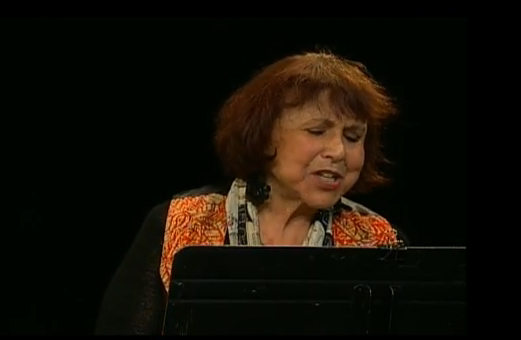 In 2008, I moved to Yonkers, New York, and came across Blue Door Gallery, a quaint gallery on a main street next to a boarded-up building. Giving back to community and nurturing diversity is essential to who I am. I began as a volunteer, facilitating writing workshops, and with the help of Poets & Writers, I became Blue Door Gallery's poet-in-residence, and ArtSpeak was born.
In 2008, I moved to Yonkers, New York, and came across Blue Door Gallery, a quaint gallery on a main street next to a boarded-up building. Giving back to community and nurturing diversity is essential to who I am. I began as a volunteer, facilitating writing workshops, and with the help of Poets & Writers, I became Blue Door Gallery's poet-in-residence, and ArtSpeak was born.
The ArtSpeak workshops give participants an opportunity to use exhibitions as writing prompts and inspiration. A packet is distributed that contains an agenda with the current exhibition program, ArtSpeak Walk (which includes questions, poems, and readings related to the artwork), an explanation of ekphrastic writing, and an evaluation form.
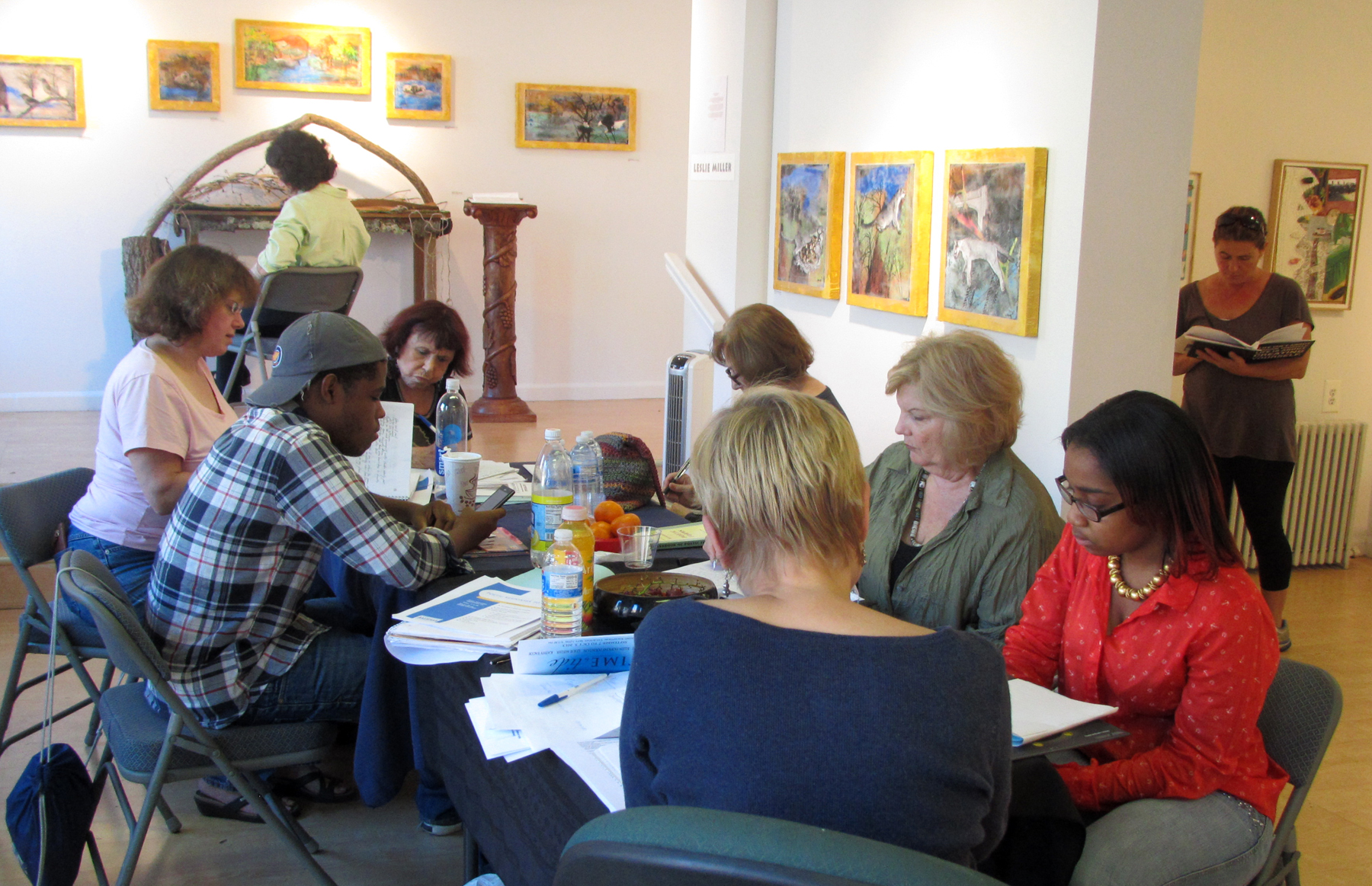 I facilitate eight workshops each calendar year, as well as two in the community outreach summer program. Each workshop is two and a half hours and allows leisurely viewing of the art with ample time for first draft free-writing and sharing in a welcoming atmosphere. Recent workshops have included an additional From Page to Performance workshop hour. Friends, family, and community members are invited to witness our “raw” work. On occasion, the artists attend, answer questions, and are invited to write—a rewarding experience for all.
I facilitate eight workshops each calendar year, as well as two in the community outreach summer program. Each workshop is two and a half hours and allows leisurely viewing of the art with ample time for first draft free-writing and sharing in a welcoming atmosphere. Recent workshops have included an additional From Page to Performance workshop hour. Friends, family, and community members are invited to witness our “raw” work. On occasion, the artists attend, answer questions, and are invited to write—a rewarding experience for all.
It’s been said that I am playfully stubborn in my determination to bring out the best in all who are there. My background in communications has taught me how to help those with public speaking jitters and I personally understand what it’s like to have anxiety. As a child, I stopped playing the piano because of my fears and I try my best not to let that happen to anyone in my care. As one participant remarked, “For me, this was the best workshop/writing experience I’ve ever had. The group of writers was as varied as our ages and it gave the event incredible energy. I also felt free of my fears. In this workshop, I allowed myself to read my poem without quivering.”
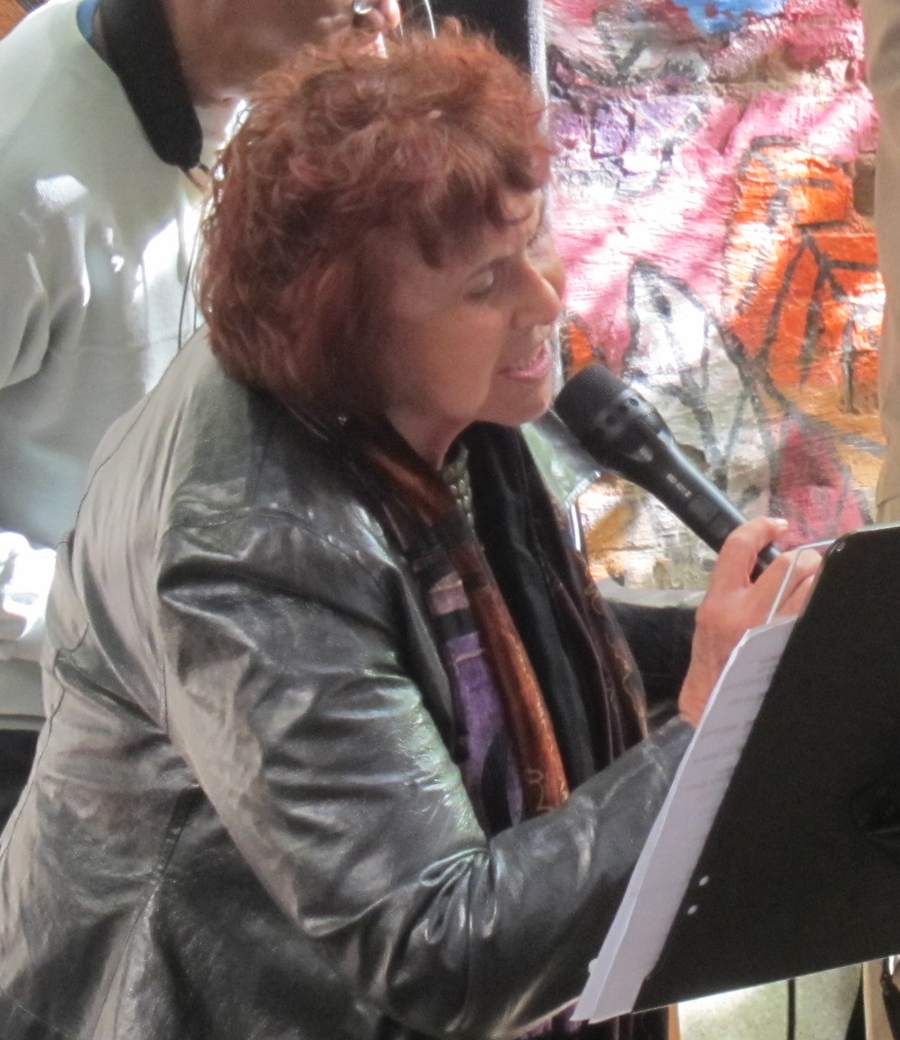 It is gratifying and a privilege to work with these writers and receive positive feedback. One member noted, “This need to accept my creative side is the invaluable part of the ArtSpeak experience for me. The other part is working with visual art and having this art as prompts to stir my words."
It is gratifying and a privilege to work with these writers and receive positive feedback. One member noted, “This need to accept my creative side is the invaluable part of the ArtSpeak experience for me. The other part is working with visual art and having this art as prompts to stir my words."
Blue Door Gallery has included ArtSpeak poems in publications and honored the artists with three ArtSpeak chapbooks. The gallery will soon inaugurate Blue Door Quarterly with writings from each ArtSpeak workshop. These publications have offered an opportunity for established writers and emerging poets to be published together. Support from the Readings & Workshops program of Poets & Writers has helped establish Blue Door Gallery as a cultural center in downtown Yonkers. On these streets of grit and energy, I am proud to be known as the ArtSpeak lady. I am always teacher and learner.
Photos: (top) Golda Solomon, (middle) Golda Solomon and ArtSpeak Class. Photo Credit: Maureen Hatch.
Photo: (bottom) Golda Solomon. Photo Credit: Zak Sherzad.
Support for Readings/Workshops in New York is provided, in part, by public funds from the New York State Council on the Arts, with additional support from the Friends of Poets & Writers.
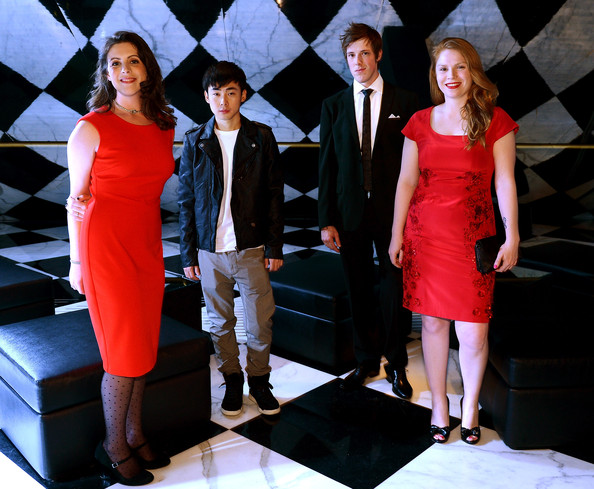 The inaugural winners of the prize were Mattia Conti of Molteno, Italy; Leisl Egan of Melbourne, Australia; Angel Mario Fernández of Soraluze, Spain; Sarah Harris Wallman of New Haven, Connecticut; and Peng Yang of Beijing, China. They each received €5,000, and were honored at an event at the Prada Epicenter in New York City in October 2013. At the event, excerpts of their stories were read aloud by writers and actors Jonathan Ames, Zoe Kazan, Anthony Mackie, Jay McInerney, and Gary Shteyngart. Over 1,300 entries in over 30 languages were submitted for the 2013 prize. The 2013 Prada Journal can be downloaded from the Prada website and read in both the original language and in English. Of the five winning entries, two were written in English, one in Italian, one in Spanish, and one in Mandarin Chinese.
The inaugural winners of the prize were Mattia Conti of Molteno, Italy; Leisl Egan of Melbourne, Australia; Angel Mario Fernández of Soraluze, Spain; Sarah Harris Wallman of New Haven, Connecticut; and Peng Yang of Beijing, China. They each received €5,000, and were honored at an event at the Prada Epicenter in New York City in October 2013. At the event, excerpts of their stories were read aloud by writers and actors Jonathan Ames, Zoe Kazan, Anthony Mackie, Jay McInerney, and Gary Shteyngart. Over 1,300 entries in over 30 languages were submitted for the 2013 prize. The 2013 Prada Journal can be downloaded from the Prada website and read in both the original language and in English. Of the five winning entries, two were written in English, one in Italian, one in Spanish, and one in Mandarin Chinese.




 In 2008, I moved to Yonkers, New York, and came across Blue Door Gallery, a quaint gallery on a main street next to a boarded-up building. Giving back to community and nurturing diversity is essential to who I am. I began as a volunteer, facilitating writing workshops, and with the help of Poets & Writers, I became Blue Door Gallery's poet-in-residence, and ArtSpeak was born.
In 2008, I moved to Yonkers, New York, and came across Blue Door Gallery, a quaint gallery on a main street next to a boarded-up building. Giving back to community and nurturing diversity is essential to who I am. I began as a volunteer, facilitating writing workshops, and with the help of Poets & Writers, I became Blue Door Gallery's poet-in-residence, and ArtSpeak was born. I facilitate eight workshops each calendar year, as well as two in the community outreach summer program. Each workshop is two and a half hours and allows leisurely viewing of the art with ample time for first draft free-writing and sharing in a welcoming atmosphere. Recent workshops have included an additional From Page to Performance workshop hour. Friends, family, and community members are invited to witness our “raw” work. On occasion, the artists attend, answer questions, and are invited to write—a rewarding experience for all.
I facilitate eight workshops each calendar year, as well as two in the community outreach summer program. Each workshop is two and a half hours and allows leisurely viewing of the art with ample time for first draft free-writing and sharing in a welcoming atmosphere. Recent workshops have included an additional From Page to Performance workshop hour. Friends, family, and community members are invited to witness our “raw” work. On occasion, the artists attend, answer questions, and are invited to write—a rewarding experience for all. It is gratifying and a privilege to work with these writers and receive positive feedback. One member noted, “This need to accept my creative side is the invaluable part of the ArtSpeak experience for me. The other part is working with visual art and having this art as prompts to stir my words."
It is gratifying and a privilege to work with these writers and receive positive feedback. One member noted, “This need to accept my creative side is the invaluable part of the ArtSpeak experience for me. The other part is working with visual art and having this art as prompts to stir my words."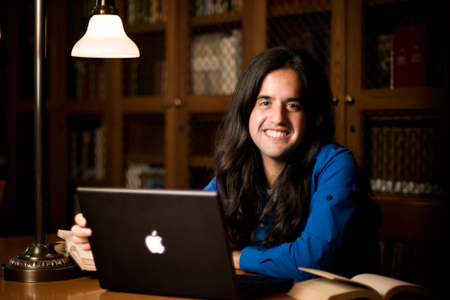 Once I started winning awards and seeing things in print, though, I stopped doubting and fearing my ambition. And if that self-doubt ever creeps up on me again, I can remember that I had the same feeling of worry and panic and confusion when I was writing the pieces that won these awards, and so I should spend the energy on the writing and not on unfounded panic.
Once I started winning awards and seeing things in print, though, I stopped doubting and fearing my ambition. And if that self-doubt ever creeps up on me again, I can remember that I had the same feeling of worry and panic and confusion when I was writing the pieces that won these awards, and so I should spend the energy on the writing and not on unfounded panic.  Carson
Carson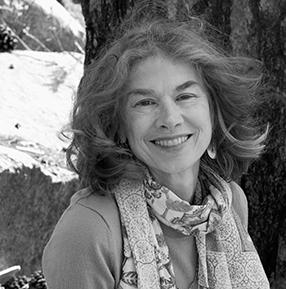
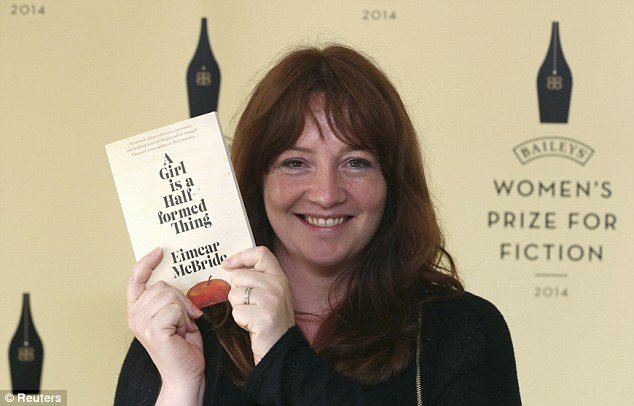 The judges for this year’s prize were Mary Beard, Denise Mina, Caitlin Moran, Sophie Raworth, and chair of judges Helen Fraser, who called McBride’s winning book “an amazing and ambitious novel that impressed the judges with its inventiveness and energy. This is an extraordinary new voice—this novel will move and astonish the reader.”
The judges for this year’s prize were Mary Beard, Denise Mina, Caitlin Moran, Sophie Raworth, and chair of judges Helen Fraser, who called McBride’s winning book “an amazing and ambitious novel that impressed the judges with its inventiveness and energy. This is an extraordinary new voice—this novel will move and astonish the reader.”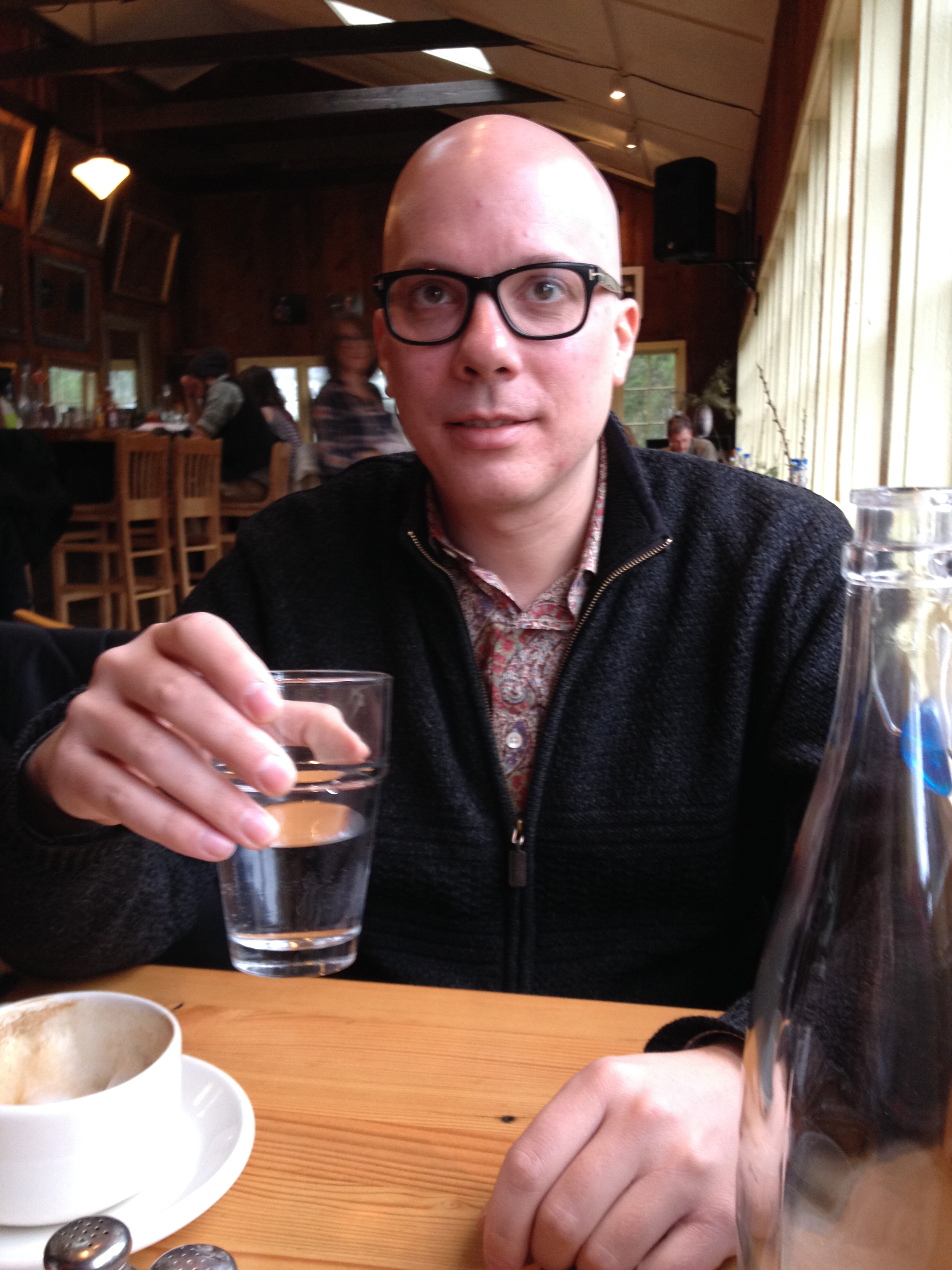 What kind of impact has winning the Whitman Award had on your career?
What kind of impact has winning the Whitman Award had on your career?